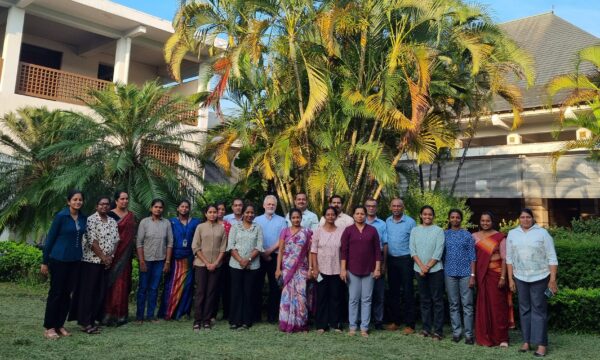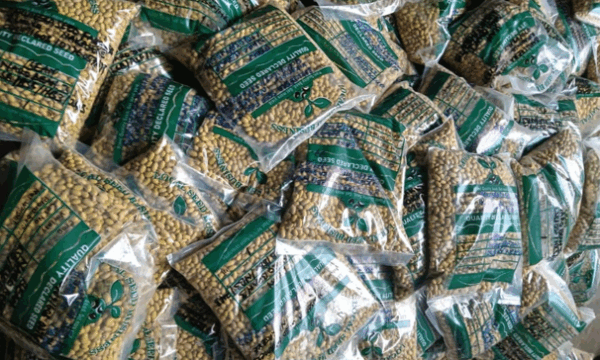
The CABI-led Plantwise programme made considerable progress to help strengthen plant health systems, livelihoods, and food security in Burundi, according to the end evaluation report published by the Royal Tropical Institute (KIT) based in The Netherlands.
Investigators Boudy van Schagen, Senior Advisor Agriculture and Seed Systems at KIT, and Dr Nicodème Nimenya, an agricultural economist and independent consultant, said the programme had either ‘met’ or ‘exceeded’ expectations.
The ‘End evaluation of CABI Plantwise Burundi (2020-2023)’ highlights that both men and women smallholder farmers are positive about their plant clinic experiences and most see the facility as ‘the best source of information on plant health.’
Implementing the advice given
Most smallholder farmers reported that they are implementing the advice they were given to tackle potentially devastating crop pests and diseases such as fall armyworm on maize, mealybug on mango trees and bacterial wilt on bananas.
Women and men also reported much improved joint decision-making and collaboration in their household activities, which are clear indications of gender-transformative change.
However, the report also stresses that improvements in plant health extension exposed, as a result of Plantwise interventions, weaknesses in input supply– notably the lack of farmer access to quality seed and appropriate plant protection products.
Furthermore, the investigators, in addition to making several recommendations, state that plant clinics are still relatively sparse and too distant for many farmers to have easy access to their services.
Focus on consolidating achievements
The project, the investigators say, will “need to focus on consolidating its achievements and strengthening Ministère de l’Environnement, de l’Agriculture et de l’Elevage (MINEAGRIE) ownership of the Plantwise model and associated policy reorientation.”
Burundi relies heavily on agriculture. Around 80% of the population depends on it for their livelihood. Providing adequate support to the agricultural sector to tackle weak linkages in the food value chain – particularly in respect of crop pests and diseases – is crucial. This supports sustainable development and long-term economic success.
CABI helped Burundi establish a network of 121 local plant clinics, run by trained plant doctors, where farmers receive practical plant health advice which supports them to grow more and lose less to crop pests and diseases.
This was achieved by working in partnership with the Institut des Sciences Agronomiques du Burundi (ISABU) and the Department of Plant Protection of Burundi (DPV) of MINEAGRIE of Burundi and with gratefully acknowledged funding from the Embassy of the Kingdom of the Netherlands in Bujumbura and The Dutch Organization for Internationalization in Education (NUFFIC).
Recommendations
Among five key recommendations made, the investigators suggest a focus on the continuity of quality plant health advice, the availability of recommended seeds and chemicals, improving data management processes, and strengthening the engagement of DPV and the Provincial Office for the Environment, Agriculture and Livestock (BPEAE).
They also say that Plantwise can be better ‘institutionalised’ in the Burundi plant health system by working more effectively with institutional partners, civil society, and the private sector. This includes promoting national ownership of the Plantwise agenda and seeking complementary funding to develop it.
The investigators also suggest that the programme should continue with a gender empowerment approach but with different implementation. The current process is “relatively expensive and very difficult to scale up.” The activity lies outside the Plantwise core business, and a strong (scaling) partner is needed, they say.
Visit to update on progress
The ‘End evaluation of CABI Plantwise Burundi (2020-2023)’ was published as staff from the Government of the Netherlands’ Directorate-General for International Cooperation (DGIS) visited the Plantwise project in Burundi for an update on its progress.
This included discussing the prospect of Plantwise in Burundi being elevated to the PlantwisePlus programme which enhances crop pest and disease identification and management recommendations using a range of digital tools and data technologies.
DGIS staff were given a tour of the facilities within ISABU. These included the mango mealybug parasitoid rearing facility and the recently refurbished plant pathology laboratory.
Jan Willem Nibbering, the senior food security expert of the Embassy of the Kingdom of the Netherlands in Burundi, said, “The Plantwise programme in Burundi has made quite some progress in developing an integrated plant health system, linking, and strengthening its various components: extension, research, input supply and regulation.
“In doing so, Plantwise puts male and female farmers at the forefront, in such a way that both women and men in the household are in a better-informed position to improve their livelihoods by growing more and losing less to crop pests and diseases.”
Additional infotmation
Main image: A smallholder farmer in Burundi receives advice on crop pest management using digital tools from the PlantwisePlus Toolkit (Credit: CABI).
End evaluation of CABI Plantwise Burundi (2020-2023)
You can read the full ‘End evaluation of CABI Plantwise Burundi (2020-2023) here.
Other relevant news and blogs
‘Empowering farmers in Burundi through Plantwise plant health rallies.’
‘Burundi steps up training efforts to meet country’s need for more Plantwise plant doctors.’
Related News & Blogs
CABI Academy supports Vietnamese universities in training the next generation of plant health professionals
Plant health lies at the centre of food security and sustainable agriculture. In Vietnam, as in many countries, preparing the next generation of plant specialists with the latest knowledge and practical skills is essential to achieving this goal. Under…
7 July 2025




